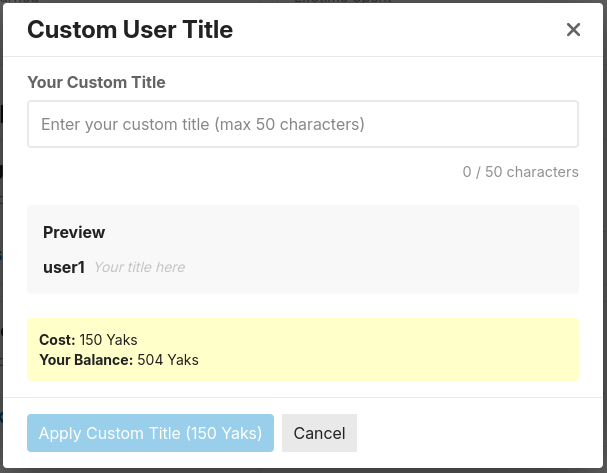Building Yaks: A Virtual Currency System for Discourse (Part 4: Custom Titles and Earning System)
Part 1 covered the backend architecture, Part 2 covered topic pinning and expiration, and Part 3 covered topic boosting and custom avatar flair. This post covers two more major features: custom user titles and the automatic earning system.
Custom User Titles
Custom titles let users spend Yaks to set a custom title displayed next to their username throughout the forum. Unlike Discourse's built-in title system (which is tied to badges and trust levels), Yak titles are purely cosmetic and time-limited.

The Challenge: Serializer Discovery
The first attempt seemed straightforward: override the title field in the
user serializers. But after implementing it, the title showed in user cards
and profiles but not next to posts. Why?
Discourse uses different serializer methods for different contexts:
title: Used in user cards, profiles, group member listsuser_title: Used specifically inPostSerializerfor post display
This makes sense from an architecture perspective. Posts need their own serializer method because they serialize the user as a nested object, not as the main object.
The Solution: Override Both
The fix required overriding both serializer methods across multiple serializers:
# For user cards, profiles, groups
[:post, :user_card, :post_action_user, :user_name,
:group_post_user, :group_user, :hidden_profile].each do |serializer_name|
add_to_serializer(serializer_name, :title) do
title_data = object.custom_fields["yak_features"]&.dig("title")
if title_data && title_data["enabled"]
title_data["text"]
else
object.title
end
end
end
# For post display (critical!)
add_to_serializer(:post, :user_title) do
user = object&.user
return nil unless user
title_data = user.custom_fields["yak_features"]&.dig("title")
if title_data && title_data["enabled"]
title_data["text"]
else
user.title
end
end
In PostSerializer, object is a Post, so we access the user via
object.user. In user-focused serializers, object is the User directly.
The Frontend Modal

The custom title modal is straightforward:
@tracked customTitle = "";
get characterCount() {
return this.customTitle.length;
}
get isOverLimit() {
return this.characterCount > 50;
}
get canApply() {
return this.customTitle.trim().length > 0 &&
!this.isOverLimit &&
this.currentUser.yak_balance >= this.cost;
}
Live preview, character counter, balance check. The modal shows exactly what the title will look like before spending Yaks.
The Earning System
This was the most complex feature to implement. Users needed a way to earn Yaks by contributing to the community, with anti-gaming measures built in.
Requirements
From the start, the requirements were clear:
- Be modular (database-driven, not hardcoded)
- Rate limiting (can't spam posts to farm Yaks)
- Trust level requirements (new accounts can't abuse it)
- Content length minimums (beyond Discourse's defaults, prevent low-effort farming)
Database Schema
Instead of hardcoding earning rules in the service, we made them database-driven:
create_table :yak_earning_rules do |t|
t.string :action_key, null: false
t.string :action_name, null: false
t.text :description
t.integer :amount, null: false, default: 0
t.integer :daily_cap, null: false, default: 0
t.integer :min_trust_level, null: false, default: 0
t.boolean :enabled, null: false, default: true
t.jsonb :settings, default: {}
t.timestamps
end
Seeded with four default rules:
- Post Created: 2 Yaks, 20/day cap, TL1+, 20 character minimum
- Topic Created: 5 Yaks, 10/day cap, TL1+, 50 character minimum
- Post Liked: 3 Yaks, 30/day cap, TL1+
- Solution Accepted: 25 Yaks, no cap, TL1+
The settings jsonb column allows flexible per-rule configuration like
content length minimums without schema changes.
Service Layer
YakEarningService handles all validation and awarding logic:
def self.award(user:, action_key:, related_post: nil, related_topic: nil)
rule = YakEarningRule.get_rule(action_key)
return false if !rule
# Check trust level requirement
return false if user.trust_level < rule.min_trust_level
# Check minimum content length if applicable
if rule.min_length > 0
content = related_post&.raw || related_topic&.first_post&.raw || ""
return false if content.length < rule.min_length
end
# Check daily cap
if rule.has_daily_cap?
earned_today = get_daily_earning_count(user, action_key)
return false if earned_today >= rule.daily_cap
end
# Award the Yaks
wallet = YakWallet.find_or_create_by(user: user)
YakTransaction.create!(
user: user,
yak_wallet: wallet,
amount: rule.amount,
transaction_type: "earn",
description: "Earned from: #{rule.action_name}",
related_post: related_post,
related_topic: related_topic,
)
wallet.update!(balance: wallet.balance + rule.amount)
# Publish balance update to frontend
MessageBus.publish("/yak-balance/#{user.id}",
{ balance: wallet.balance },
user_ids: [user.id])
true
end
The service returns a boolean so we can track success/failure in logs.
Rate Limiting Implementation
Daily caps are enforced by counting today's transactions:
def self.get_daily_earning_count(user, action_key)
wallet = YakWallet.find_by(user: user)
return 0 if !wallet
rule = YakEarningRule.find_by(action_key: action_key)
return 0 if !rule
start_of_day = Time.zone.now.beginning_of_day
YakTransaction
.where(yak_wallet: wallet)
.where(transaction_type: "earn")
.where("description LIKE ?", "Earned from: #{rule.action_name}")
.where("created_at >= ?", start_of_day)
.count
end
Single query per award attempt. Could be cached if it becomes a bottleneck, but the query is fast.
Event Hooks
Discourse provides events for all the actions we care about:
DiscourseEvent.on(:post_created) do |post, opts, user|
next if post.post_type != Post.types[:regular]
next if post.deleted_at.present?
next if post.hidden
next if !post.user
YakEarningService.award(
user: post.user,
action_key: "post_created",
related_post: post,
related_topic: post.topic,
)
end
DiscourseEvent.on(:like_created) do |post_action|
post = post_action.post
next if !post
next if post.deleted_at.present?
next if post.hidden
next if post.user_id == post_action.user_id # No self-likes
YakEarningService.award(
user: post.user,
action_key: "post_liked",
related_post: post,
related_topic: post.topic,
)
end
We also hook topic_created and accepted_solution (from the
discourse-solved plugin, if installed).
Real-Time Balance Updates
The original implementation had a problem: after earning Yaks, the user menu still showed the old balance. Page refresh required.
The fix uses MessageBus, Discourse's real-time messaging system:
Backend: Publish when balance changes
MessageBus.publish("/yak-balance/#{user.id}",
{ balance: wallet.balance },
user_ids: [user.id])
Frontend: Subscribe and update
const messageBus = container.lookup("service:message-bus");
messageBus.subscribe(`/yak-balance/${currentUser.id}`, (data) => {
currentUser.set("yak_balance", data.balance);
});
Now when you create a post, the balance in your user menu updates instantly. No polling, no page refresh.
Bugs Fixed
Some bugs were discovered during manual testing. All three would have been caught immediately by integration tests.
Bug 1: Event Hook User Parameter
The Discourse event signature includes a user parameter:
DiscourseEvent.on(:post_created) do |post, opts, user|
The first implementation used that parameter directly:
YakEarningService.award(user: user, ...)
But that user parameter is nil. The actual user must be accessed via
post.user. The test would have failed immediately with "User can't be
blank".
Bug 2: Topic.raw Doesn't Exist
Content length validation tried to access topic.raw:
content = related_post&.raw || related_topic&.raw || ""
But topics don't have a raw field. Only posts do. The fix:
content = related_post&.raw || related_topic&.first_post&.raw || ""
A test creating a topic would have crashed with "undefined method `raw' for Topic".
Bug 3: Missing User in Transaction
YakTransaction has a belongs_to :user association, which validates
presence by default in Rails. But we weren't passing it:
YakTransaction.create!(
yak_wallet: wallet,
amount: rule.amount,
...
)
Should be:
YakTransaction.create!(
user: user,
yak_wallet: wallet,
amount: rule.amount,
...
)
Any test attempting to create a transaction would have failed validation.
A New Basic Test Suite Structure
The test suite covers all validation paths:
RSpec.describe YakEarningService do
describe ".award" do
it "awards Yaks for valid post by TL1 user" do
post = Fabricate(:post, user: user, raw: "This is a test post...")
result = YakEarningService.award(
user: post.user,
action_key: "post_created",
related_post: post,
related_topic: post.topic,
)
expect(result).to eq(true)
expect(user.reload.yak_balance).to eq(2)
end
it "does not award Yaks to TL0 user" do
post = Fabricate(:post, user: tl0_user, raw: "...")
result = YakEarningService.award(
user: post.user,
action_key: "post_created",
related_post: post,
)
expect(result).to eq(false)
expect(tl0_user.reload.yak_balance).to eq(0)
end
it "respects daily cap" do
rule = YakEarningRule.find_by(action_key: "post_created")
# Create posts up to daily cap
rule.daily_cap.times do
post = Fabricate(:post, user: user, raw: "...")
YakEarningService.award(user: post.user, ...)
end
# Next post should fail due to cap
post = Fabricate(:post, user: user, raw: "...")
result = YakEarningService.award(user: post.user, ...)
expect(result).to eq(false)
end
end
end
Tests force you to think about edge cases: trust levels, content length, daily caps, disabled rules.
Admin UI

The admin UI shows all earning rules in a table:
- Action name and description
- Amount of Yaks awarded
- Daily cap (or "No limit")
- Minimum trust level
- Enabled status
Architecture Wins
Database-Driven Configuration: No code changes needed to adjust earning amounts or daily caps. Just update the database.
Event-Driven: Loosely coupled. The earning system doesn't need to know about post creation internals, just subscribes to events.
Real-Time Updates: MessageBus makes instant balance updates trivial. Six lines of code for publish and subscribe.
Proper Service Layer: Business logic lives in YakEarningService, not
scattered across controllers and models.
Full Audit Trail: Every earning action creates a transaction record with type, amount, description, and related post/topic. Complete history.
Performance Considerations
Single Query for Rate Limiting: The daily count query is simple and fast. Could be cached if it becomes a bottleneck.
No N+1 Queries: Balance updates happen during the transaction creation, no separate queries.
MessageBus Efficiency: Only publishes to the specific user who earned Yaks. Not broadcasting to everyone.
Indexed Properly: Transactions table has indexes on yak_wallet_id,
transaction_type, and created_at for the daily count query.
What's Left
The plugin is now feature-complete for the MVP:
- Wallet system with transaction logging
- Multiple purchasable features (post highlighting, topic boosting, custom flair, custom titles)
- Expiration system (features automatically expire)
- Earning system (users earn Yaks by contributing)
- Admin UI (view stats, packages, features, earning rules)
- Real-time updates (no page refresh needed)
Remaining work:
- Payment integration (Stripe or similar) for purchasing Yak packages
- Guardian authorization checks (ensure users can only spend their own Yaks)
- More earning actions (first reply, helpful flags, etc.)
- Admin edit functionality for earning rules
- Production monitoring and adjustment based on real usage
Lessons Learned
Serializers Are Powerful: Understanding Discourse's serializer architecture unlocks a lot of customization possibilities.
MessageBus Is Handy: Real-time updates are easy with MessageBus, yet some plugins don't use it.
Database-Driven Config Is Worth It: The upfront effort to make earning rules configurable pays off in flexibility.
Event Hooks Are Reliable: Discourse's event system is solid. Events fire consistently and provide the data you need.
Conclusion
Building a virtual currency system is teaching me a lot about Discourse's architecture. Serializers, custom fields, MessageBus, service objects, event hooks - all pieces that work together to create a cohesive plugin.
The earning system was the most complex feature, but also the most rewarding. Watching a user create a post and seeing their balance update instantly, knowing that every piece of the system is working together (event hooks, service validation, database transactions, MessageBus publishing, frontend subscription) - that's satisfying.
The full source code is available at github.com/ducks/discourse-yaks. If you're building a Discourse plugin and want to see how all these pieces fit together, the repo should be a useful reference.
Next up: Payment integration and production deployment. Stay tuned for Part 5.